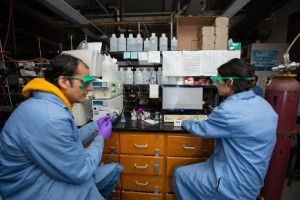More of Michigan Tech’s PhD level engineering and science programs than ever made US News & World Report’s annual graduate school rankings, released today. The rankings reflect momentum generated by Michigan Tech’s focus on graduate education and research, said Provost Max Seel. The Graduate School has more than doubled its enrollment since 2005.
Michigan Tech’s PhD engineering programs earned an overall ranking of 90th, tied with George Washington University, Rochester Institute of Technology and Mississippi State University. Biomedical engineering at Tech showed up in the rankings for the first time, placing 71st.
